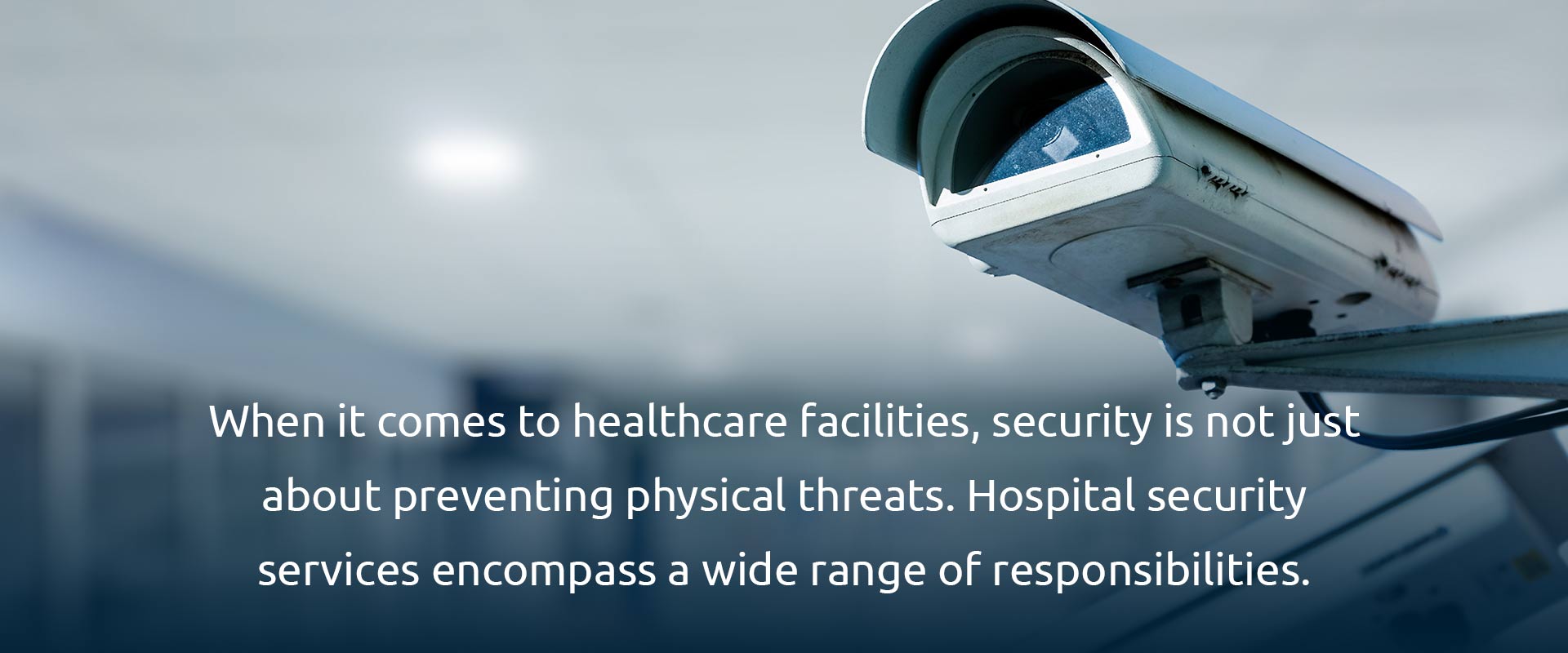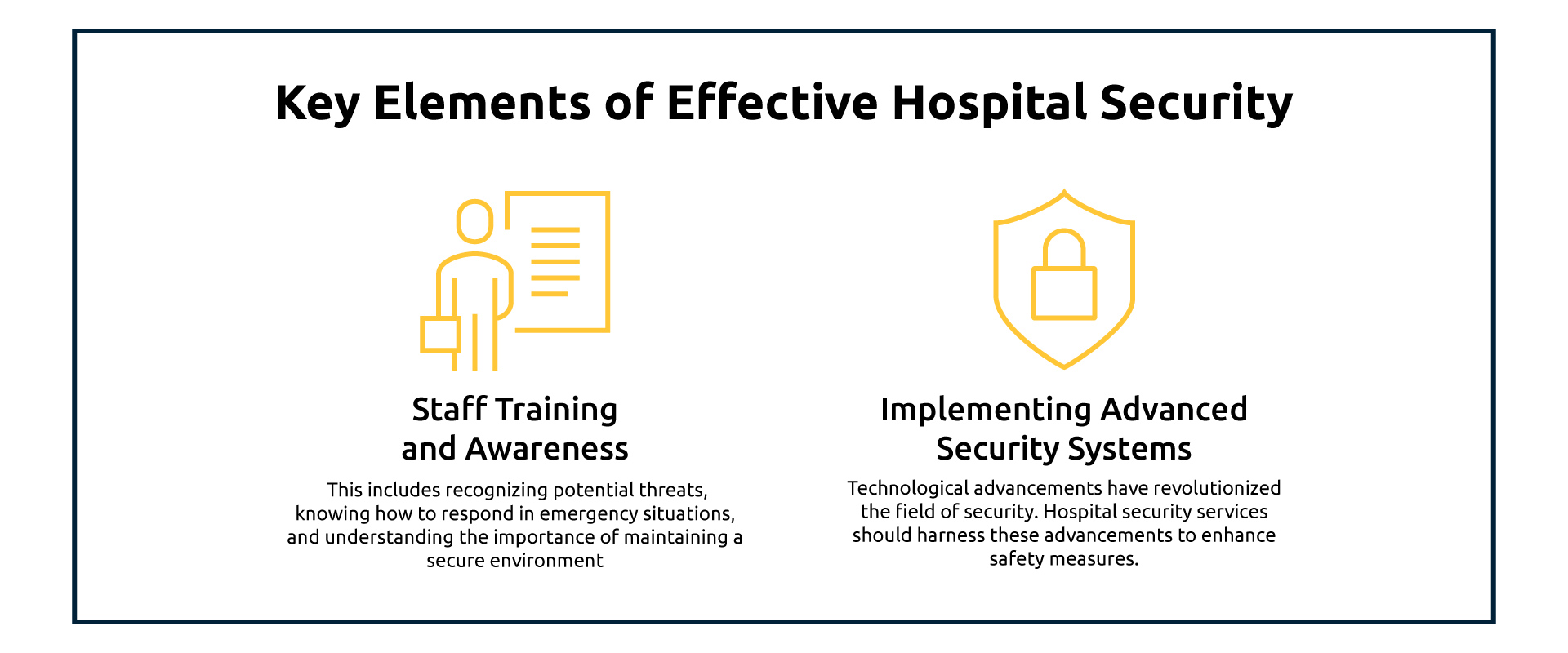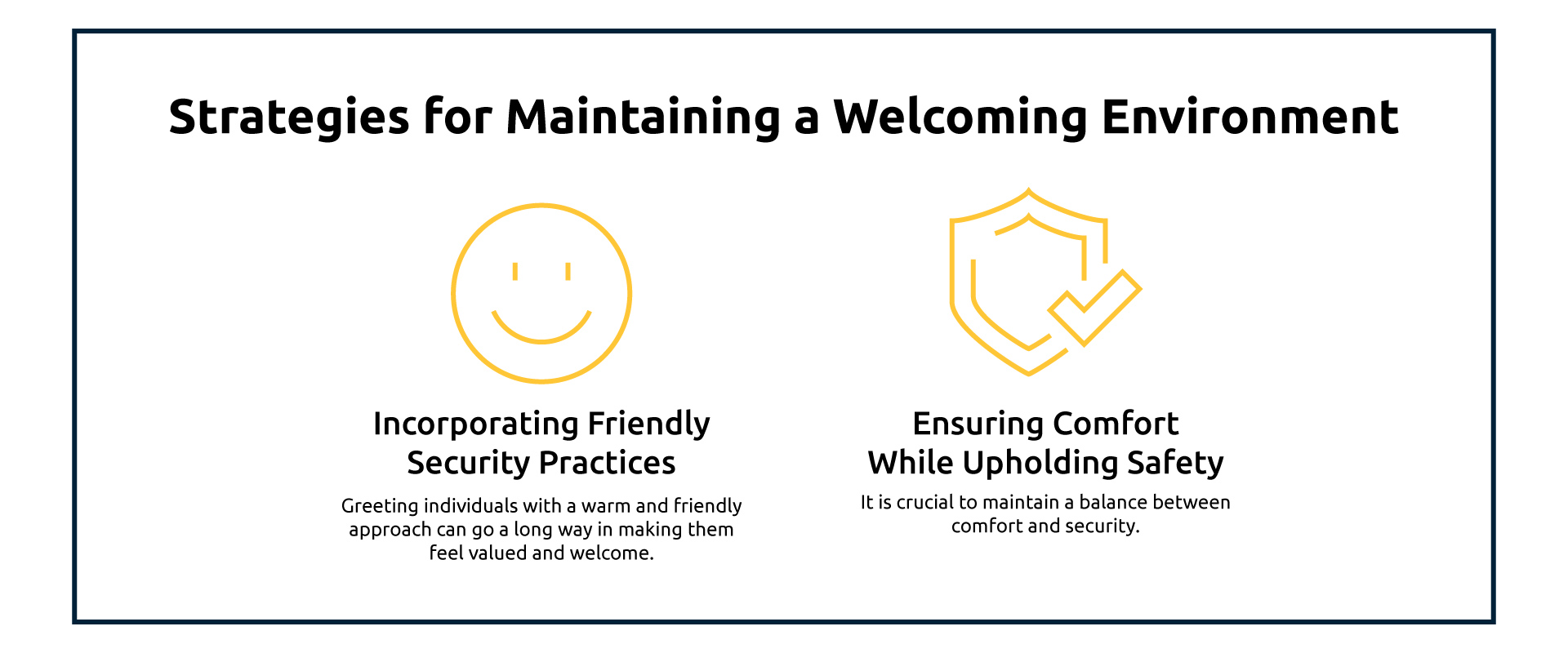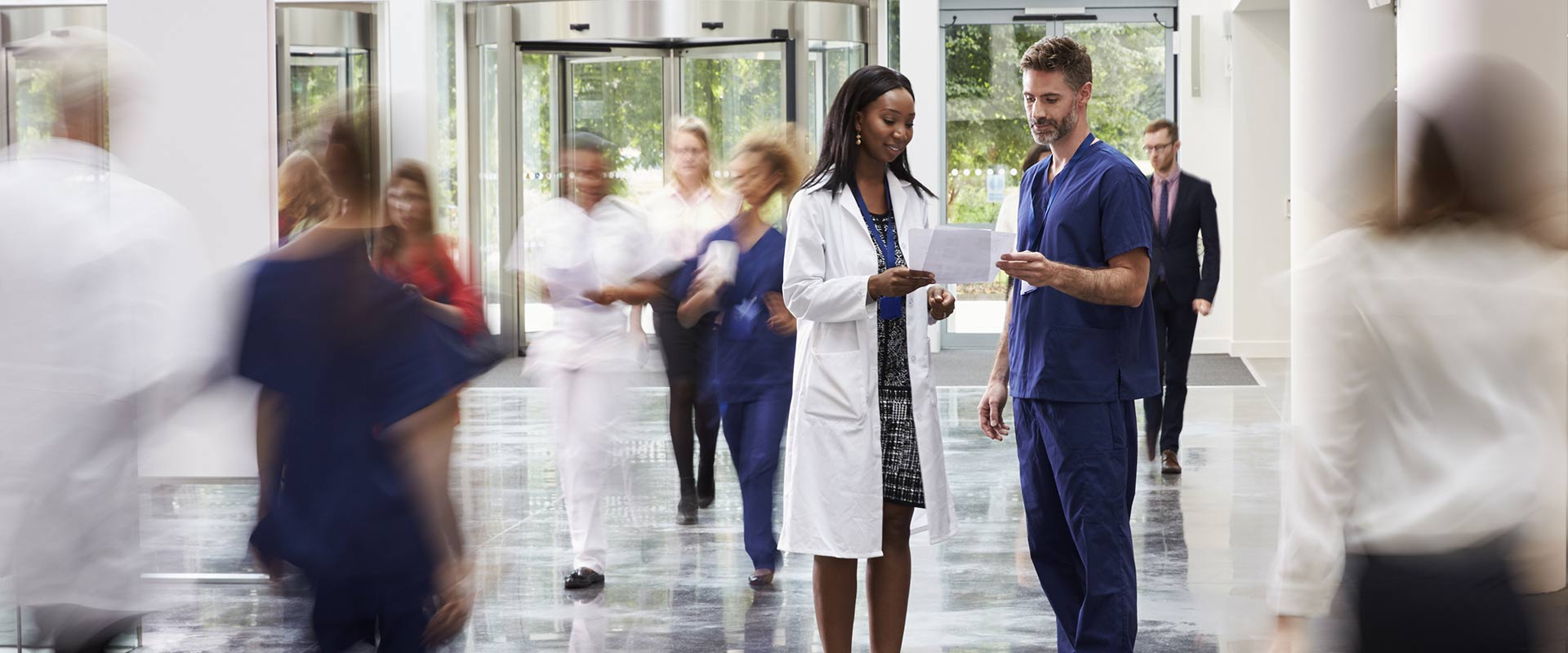In today’s world, ensuring safety and security is of utmost importance, especially in healthcare facilities such as hospitals. Hospitals are not only expected to provide quality medical care but also maintain a safe and welcoming environment for patients, their families, and staff members. This is where hospital security services play a crucial role. Understanding the importance of hospital security services and implementing key elements of effective security is essential for creating a secure and comfortable environment.
By enhancing patient experience and incorporating friendly security practices, hospitals can uphold safety while ensuring a welcoming atmosphere. Regular security audits and adapting to changing security needs are also vital to continuously evaluate and improve a hospital’s security services.
 Understanding the Importance of Hospital Security Services
Understanding the Importance of Hospital Security Services
When it comes to healthcare facilities, security is not just about preventing physical threats. Hospital security services encompass a wide range of responsibilities. These include ensuring the safety of patients, staff, and visitors, protecting sensitive information, preventing theft and vandalism, managing emergency situations, and maintaining order and tranquility within the hospital premises.
Healthcare facilities are vulnerable to various security risks, including unauthorized access, workplace violence, theft of medication or equipment, patient elopement, and potential terrorist threats. These risks can not only compromise patient safety but also impact the hospital’s reputation and financial stability. Therefore, investing in comprehensive hospital security services is paramount.
The Role of Security in Healthcare
Hospital security services go beyond traditional measures. Security personnel are trained to understand the unique needs and challenges of healthcare facilities. Their primary role is not only to deter and respond to security incidents but also to promote a safe and welcoming environment.
Security personnel act as a visible deterrent to potential threats, ensuring that individuals with malicious intent think twice before attempting any wrongdoing. Additionally, they also create a sense of safety and comfort for patients and staff members.
In emergency situations, hospital security services are instrumental in managing the chaos and ensuring the safety of everyone involved. They work closely with law enforcement agencies, fire departments, and other emergency responders to coordinate an effective response. Their training in emergency preparedness and crisis management enables them to handle high-stress situations with composure and efficiency.
Balancing Safety and Hospitality in Hospitals
One of the challenges hospitals face is finding the right balance between safety and hospitality. While ensuring the security of patients and staff is paramount, it is equally important to maintain a friendly and welcoming atmosphere.
To achieve this balance, hospital security services should focus on adopting a customer service mindset. Security personnel should be trained to provide assistance and guidance to patients and visitors, making them feel comfortable and supported during their hospital stay.
Furthermore, hospital security services can contribute to the overall well-being of patients by actively participating in initiatives aimed at preventing healthcare-associated infections. They can enforce hand hygiene protocols, monitor visitor access, and ensure compliance with infection control measures.
It is crucial to remember that a secure environment does not mean a rigid and unwelcoming one. By fostering positive relationships between security personnel and the hospital community, a sense of trust and cooperation can be established. This can be achieved through regular communication, community outreach programs, and training sessions that promote mutual understanding and respect.
In conclusion, hospital security services play a vital role in ensuring the safety, well-being, and privacy of patients, staff, and visitors. By investing in comprehensive security measures and fostering a culture of safety and hospitality, healthcare facilities can create an environment that promotes healing and trust.
 Key Elements of Effective Hospital Security
Key Elements of Effective Hospital Security
Effective hospital security relies on various key elements. Implementing these elements ensures a comprehensive approach to maintaining a safe and welcoming environment.
Hospital security is a critical aspect of healthcare facilities that cannot be overlooked. The safety and well-being of patients, staff, and visitors depend on the implementation of robust security measures. By understanding and implementing the key elements of effective hospital security, healthcare organizations can create a secure environment that promotes trust and confidence.
Staff Training and Awareness
Proper training is essential for hospital staff to understand security protocols and procedures. This includes recognizing potential threats, knowing how to respond in emergency situations, and understanding the importance of maintaining a secure environment.
Training programs should cover a wide range of security-related topics, including identifying suspicious behavior, handling aggressive individuals, and responding to medical emergencies in a secure manner. By equipping staff with the necessary knowledge and skills, hospitals can empower them to take an active role in ensuring the safety of everyone within the facility.
In addition to initial training, regular security awareness programs and drills should be conducted to keep staff members informed and prepared. These programs can include simulated emergency situations, where staff can practice their response and evaluate the effectiveness of security protocols. By regularly reinforcing security measures, hospitals can foster a culture of vigilance and preparedness among their staff.
Implementing Advanced Security Systems
Technological advancements have revolutionized the field of security. Hospital security services should harness these advancements to enhance safety measures.
One of the key elements of effective hospital security is the implementation of advanced security systems. Surveillance cameras strategically placed throughout the facility can act as a deterrent to potential threats and aid in the identification of suspicious activities. Access control systems, such as key cards or biometric scanners, can restrict unauthorized entry into sensitive areas, ensuring that only authorized personnel have access.
Alarm systems are another crucial component of hospital security. These systems can alert security personnel and relevant departments in the event of an emergency, allowing for a swift response and minimizing potential harm. By integrating these advanced security systems, hospitals can create multiple layers of protection, making it harder for any security breach to occur.
Additionally, utilizing smart technologies and integrating security systems with other hospital systems can streamline operations and improve overall security efficiency. For example, integrating security cameras with the hospital’s electronic medical record system can provide a comprehensive view of patient care while ensuring patient privacy and security.
Furthermore, hospitals can leverage data analytics to identify patterns and trends in security incidents, allowing for proactive measures to be taken. By analyzing data from various security systems, hospitals can identify areas of vulnerability and implement targeted security measures to address them.
In conclusion, effective hospital security requires a multi-faceted approach that includes staff training and awareness, as well as the implementation of advanced security systems. By investing in these key elements, hospitals can create a safe and secure environment that promotes the well-being of patients, staff, and visitors.
 Enhancing Patient Experience with a Secure Environment
Enhancing Patient Experience with a Secure Environment
A secure environment goes hand in hand with enhancing the patient experience. Patients often feel vulnerable and anxious during their hospital stay. By prioritizing privacy protection measures and reducing stress through security practices, hospitals can create a more comfortable environment.
Privacy Protection Measures
Respecting patient privacy is crucial for maintaining trust and fostering a positive patient experience. Hospitals should ensure that sensitive information is handled securely and that patient confidentiality is protected at all times.
Implementing measures such as restricted access to medical records, secure communication channels, and appropriate storage of personal belongings can significantly contribute to privacy protection.
Reducing Stress Through Security
Security measures should be designed to minimize stress for patients and their families. For example, clear signage and wayfinding systems can help patients navigate the hospital without feeling overwhelmed or confused.
Furthermore, creating a calm and reassuring atmosphere through appropriate lighting, comfortable waiting areas, and friendly security personnel can help alleviate anxiety and promote a positive patient experience.
 Strategies for Maintaining a Welcoming Environment
Strategies for Maintaining a Welcoming Environment
Maintaining a welcoming environment is essential for hospitals to ensure that patients and visitors feel comfortable and supported throughout their entire hospital experience. Implementing friendly security practices can contribute to this welcoming atmosphere.
Incorporating Friendly Security Practices
Security personnel should be trained to employ non-confrontational communication techniques and display empathy towards patients and visitors. Greeting individuals with a warm and friendly approach can go a long way in making them feel valued and welcome.
Additionally, security personnel can offer assistance to those in need, such as guiding patients to their destinations or providing information about hospital services. These small acts of kindness can create a positive and inviting environment.
Ensuring Comfort While Upholding Safety
Maintaining a welcoming environment does not mean compromising safety standards. It is crucial to maintain a balance between comfort and security.
To achieve this, hospitals should strive to create a space that is aesthetically pleasing, well-maintained, and free from hazards. Regular inspections and preventive maintenance can help identify and address potential safety concerns proactively.
Additionally, providing comfortable seating, clean facilities, and clear communication regarding security measures can enhance the overall experience for patients and visitors.
 Evaluating and Improving Your Hospital’s Security Services
Evaluating and Improving Your Hospital’s Security Services
Maintaining a safe and welcoming environment is an ongoing process. Hospitals should regularly evaluate and improve their security services to adapt to changing security needs and ensure continuous enhancement.
Regular Security Audits
Conducting regular security audits helps identify vulnerabilities and areas for improvement. These audits can cover various aspects such as physical security, staff training, access control systems, emergency preparedness, and policies and procedures.
By assessing the effectiveness of existing security measures and identifying potential gaps, hospitals can develop targeted strategies to strengthen their security services.
 Adapting to Changing Security Needs
Adapting to Changing Security Needs
Security threats constantly evolve, and hospitals must stay proactive in adapting to these changes. Regularly reviewing security protocols and staying updated with the latest industry best practices is crucial.
Hospitals should invest in ongoing training for security personnel to ensure their skills and knowledge are current. Additionally, staying connected with local law enforcement agencies and security industry organizations can provide valuable insights and resources.
In conclusion, maintaining a safe and welcoming environment with hospital security services is essential for providing optimal care to patients and creating a sense of trust with the community. By understanding the importance of security, implementing key elements of effective security, enhancing patient experience, and evaluating and improving security services, hospitals can create an environment where safety and hospitality coexist harmoniously.
Take time to invest in your safety and security ASAP. Get a free security consultation from ASAP Security today!
Reach out to ASAP Security now for any questions or if you need a quote.
We are proud of our stellar customer service record, so check our website for all the testimonials from our various satisfied customers. Call ASAP Security at 1-833-272-7247

 Understanding the Importance of Hospital Security Services
Understanding the Importance of Hospital Security Services Key Elements of Effective Hospital Security
Key Elements of Effective Hospital Security Enhancing Patient Experience with a Secure Environment
Enhancing Patient Experience with a Secure Environment Strategies for Maintaining a Welcoming Environment
Strategies for Maintaining a Welcoming Environment Evaluating and Improving Your Hospital’s Security Services
Evaluating and Improving Your Hospital’s Security Services